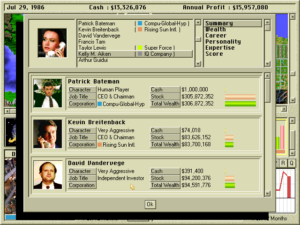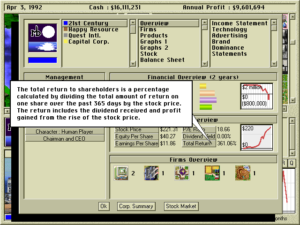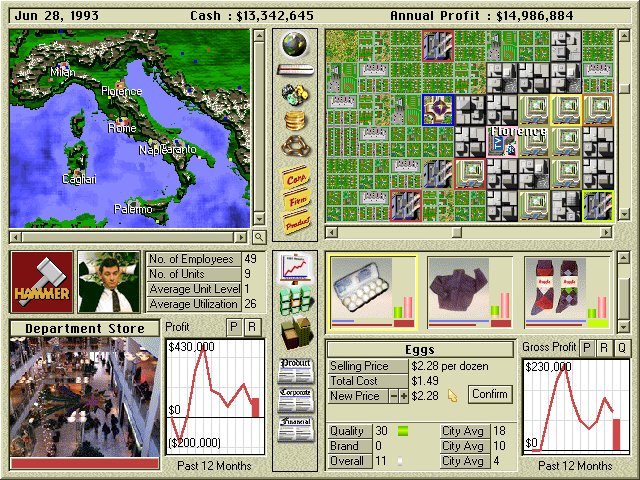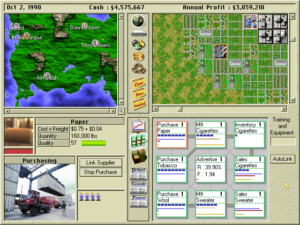Capitalism 
The tutorial for Capitalism takes an hour and a half to complete.
Capitalism isn’t merely a game about running a business. It’s a game in which you manage a massive corporation down to the smallest details, down to every statistic for measuring brand loyalty and product quality. The micromanagement in this game is so far beyond useful that it feels like it’s just trying to show off how complicated it is.
The game does seem to be faithful to the subject matter, because the endless stream of statistics and relentless pursuit of profit pretty much captures the capitalism experience.
As a mega-corporation, your responsibility is to sell things. You manage the entire process, end-to-end: buying or manufacturing the products, selling them at retail stores, paying for ad campaigns, and monitoring product performance. You’re not the only shark in the water, of course. There are a few other corporations doing the same thing you are, maybe even selling some of the same products and trying to cut out your share of the market. Describing Capitalism in those terms sounds more like a war game, which probably applies to the game as much as it applies capitalism as a concept.
Nothing works as automatically as you might expect. As CEO, you’re expected to read up and weigh in on decisions at every level of your company. Charts and statistics blanket every screen of the game like wallpaper. During the tutorial, the narrator audibly struggles to read formulas and make equations sound like natural speech. As far down as the retail stores, you have to manage the layout of the individual units that handle sales, purchasing, advertising, and inventory management. Eventually, you can hire a president to take over the minutiae, which even the game manual admits is “tedious,” but then you have to worry about salary negotiations and whether their personality is a good fit for your vision for the company.
It’s so intimidating to be inundated with this information. When you run an advertising campaign, the game reports seven different measures of advertising performance – reach, rating points, “reach/population,” cost per ad, cost per thousand impressions, daily frequency, and monthly frequency – then says you only actually need to pay attention to one of these numbers. I think Capitalism enjoys being outwardly complicated like this, even when it’s unnecessary, like that’s a reflection of how smart or serious it is.
In simulations game like Capitalism, it’s impossible to represent the world accurately, so they have to simplify the models that they’re trying to reproduce. It can be telling what parts Capitalism will gloss over and where it strives to be more detailed. You won’t see much about people, or about the impact your company has on the world (on consumers, employees, cities, the government, the environment), but the financial side of the game has so much attention heaped on it that it could double as a class on the stock market. That’s what’s most important in this game: finances and management, the MBA portion of the model.
(Finances and the stock market were the last lesson in the tutorial, and folks, it almost made me abandon the game. The first time I played Capitalism six years ago, I bailed after the first tutorial lesson, and I was ready to bail again. I cannot overstate how excessive it is, even for a business game.)
The complexity of Capitalism keeps fractally expanding the closer you look at it. If you put the work in to learn the game (and maybe enroll in business school, just to be safe), there’s a lot of interesting opportunities in there to be creative with how you run your business. It also sends questionable messages about what it means to succeed in capitalism.
To demonstrate this, let’s walk through the life of a single product. For this example, I decided to sell cigarettes. Obviously this is a huge ethical issue. We’ll come back to that in a second. In fairness, I also had a side business selling frozen chicken and sweaters.
For a small upstart company, it’s easier to sell somebody else’s product first. I built a department store and set up a purchasing department, which orders cigarettes from another country.
They sold well enough, but it’s more profitable to manufacture your own products. Instead of buying cigarettes, I imported the raw materials – paper and tobacco – then assembled them at a factory, where the inventory and sales departments work together to ship the finished product to stores.
But it’s even more profitable and reliable to produce the raw materials. To claim the resources before anyone else got the chance, I took out a $14 million loan to build a logging camp at one of the few timber sites on the map. The factory turns the timber into paper, which then gets made into cigarettes. I also purchased a cool, dry plot of land with good soil health to use as a tobacco farm. This one took a while to pay off, because I had to wait until next November to plant and March to harvest.
By manufacturing my own paper, my profits nearly tripled from $1.3 million annually to $3.4 million. Once the farm started yielding tobacco, my profits nearly doubled again. Not content to rest on this success, I opened a research lab and hired three dozen scientists to work for five years on a new hyper-potent cigarette technology, exceeding the scientifically known limits of cigarette quality.
This doesn’t even get into the issues with marketing, brand management, or, god forbid, the stock market. The point is that Capitalism foists the entire structure of global manufacturing on you. To stay alive in a competitive marketplace, your company has to keep growing, no matter what, to keep expanding into new markets, to own the entire supply chain for your business, and then to own the supply chain for somebody else’s business. An executive would spin this strategy of building supply-chain monopolies by calling it “vertical integration.”
The only objective is to run a profitable company. It doesn’t matter what the product is. You could sell laundry detergent or motorcycles. You could even make your fortune by getting people addicted to cigarettes. You just have to make something. There are no moral consequences! Keep growing! If you don’t grow, somebody else will! Drive out local businesses! Yes, Capitalism explicitly encourages you to drive out local businesses!
The financial end of the game seems downright fraudulent. Run out of money? No problem, just issue some new stock and make millions of dollars for doing nothing. I played Capitalism on Very Easy difficulty – still challenging – and at a more aggressive difficulty level, the computer opponents would have seized this opportunity to buy out my company. But it’s still ridiculous that I could pay off my debts by, essentially, making up money. When you run a big business, money is whatever you say it is!

Get a psychological profile of your competitors, or use that knowledge to poach someone to be your president
As soon as you realize what’s necessary to succeed, Capitalism collapses into a black hole of greed. You must be ruthless, totally unconcerned with your actions beyond how they affect your wealth and your brand. The trouble is that if Capitalism can be believed, this isn’t too far off from how you’d have to think if you actually ran a big corporation.
In promotional materials for Capitalism, developer Enlight Software bragged that the game was taught in business school at Harvard and Stanford, a fact they seem to have repeated so much that it’s ended up in nearly everything written about Capitalism. The game had even more widespread use in higher education than what they reported: the game’s original publisher Interactive Magic (who usually published military games, to revisit the earlier comparison) helped organize a series of competitive matches between universities, like the “Business Bowl” held in January 1996 between Duke and the University of North Carolina, two schools in the area where Interactive Magic was based.1,2
It’s understandable why the developer would boast about this. Having your simulation used at prestigious business schools is an endorsement for how realistic it is. The game does live up to that reputation, and it’s easy to imagine it being used to teach business concepts hands-on. However, it sounds like the game’s fidelity may have also raised some concerns about how big businesses operate. Tom Kosnik, the professor who taught with Capitalism at Harvard and Stanford who has since gone on to become a venture capitalist, praised the game for its high level of accuracy and difficulty, but he also noticed that some students had ethical hangups about making money from cigarettes and alcohol after realizing “how profitable they are.”3 After all, if it makes money, why wouldn’t you do it?
The trick of Capitalism is that it makes you think like a capitalist. Within the mountains of jargon and earnings reports, it lures you into the insatiable mindset you’d need in order to thrive in business and grind your competitors into dust.
Trivia!
An endearing touch in Capitalism is that you can toggle Food & Beverage mode, which only lets you make and sell food products exclusive to this mode like hamburgers. Although it’s functionally the same game, selling instant noodles significantly lowers the stakes.
Additional references
1. Interactive Magic’s First Annual “Business Bowl” A Success: Duke University Takes The Trophy. (1996, February 1). Business Wire. Retrieved from LexisNexis.
2. Stanford Beats Harvard in First National ‘Capitalism’ Contest. (1996, June 3). Business Wire. Retrieved from LexisNexis.
3. Rodgers, Paul. (1996, June 9). Bankruptcy is all part of the game for Harvard students. The Independent. Retrieved from https://www.independent.co.uk/news/business/bankruptcy-is-all-part-of-the-game-for-harvard-students-1336111.html





Great review, I really enjoyed it. Thank you.
“Capitalism Plus”? That almost sounds like satire. Any idea of what the differences between this and the original are?
I also was going to write the game itself off as ruthless satire (It’s a game you win by buying forests! How is that anything but an indictment of capitalism?) until I found out that the creators were proud of it getting used in prestigious universities.
I’d also like to point out how… pointless the grind is when you take out a lot of the stereotypical “video game” elements. No rewards at all – no plot, graphics, music, or additional forms of MENTAL STIMULATION are ever given to you as a reward for successful gameplay. The closest thing to novelty is getting to click on a window that says you bought land instead of a window that says you hired a cashier. Yet another reason I thought the game was satire; at least real capitalism lets you enjoy the fruits of your… actions if you’re successful. At least Progress Quest has a sense of humor about the whole idea.
The big difference I can tell is that Capitalism Plus adds multiplayer, as well as a bunch of other options like the Food & Beverage mode. The other major changes seem to be in the presentation (Plus is generally put together better, and the interface is beige instead of blue).
I don’t think a game like this needs an explicit reward. You’re right that there’s not a lot of highly visible change, like watching a city grow, or getting to see an example of how popular your products are, but there is still a sense of progression. It hooks into the same type of satisfaction as clicker games, where it’s fun just to see your creation grow, even if it’s mostly numbers. (Again: not too far off from actual finance.)
One other detail I couldn’t find a place to mention in the article is that Capitalism Plus adds a huge number of options for a game victory state, based on different in-game measures of wealth and growth. It reminded me of the different types of victories you can achieve in Civilization, like diplomacy, culture, etc., which makes it sound even more like a war game than it did already. The competition with other players gives the game more of a purpose than being an open-ended sandbox.
I wonder if years into the future, once we’re sucessfully transitioned into a much better society (let me dream for a moment) this game will remain as one of the principal documents future people will use to study our current time period. Great article as always!
I worked for a (now defunct) business magazine called Business Leader at the time Interactive Magic founded. Our magazine covered the Raleigh-Durham Research Triangle area and Interactive Magic was one of our cover stories, IIRC. I met “Wild Bill” Stealy and he gave me copies of their entire game library (about 3 games at that time, I think?), including Capitalism (before “Plus”). I was poor, so I was happy to receive new games for free, but damn I could make neither head-nor-tail of that game.
Wish I could find back issues of our magazine to see what Bill said about his company at the time.
This is one of my favourite games, and one of very few that I keep returning to again and again. I’d rate it as one of the top five strategy-type games I’ve ever played.